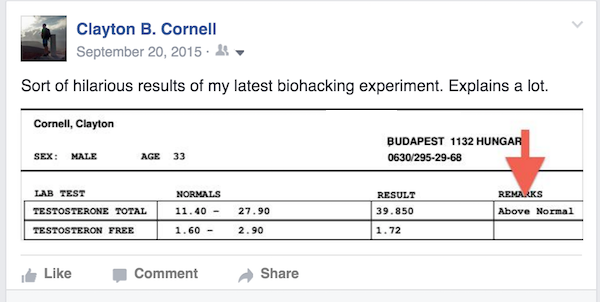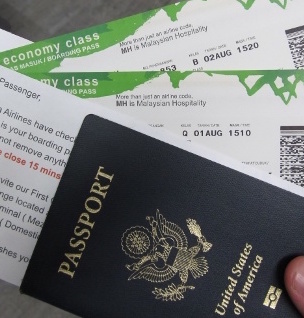The Diet that Doubled my Testosterone in 2015
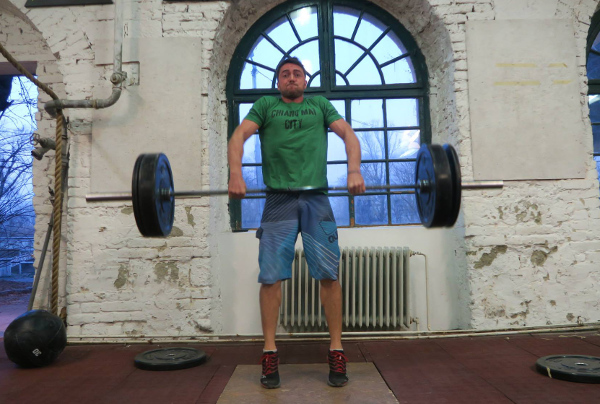
Note: This post is by popular request. I’ve received more messages requesting details on my dietary experiments than almost anything else I’ve written. For those who know the backstory you can skip to the breakdown. Disclaimer: I’m not a doctor, and this is not medical advice. Consider this functional entertainment. Also keep in mind everyone is different, and this is an n=1 experiment. With that said…
September 2015 – Throwing weights around in Budapest
“OH, WHAT’S UP NOW MOTHER——!”
The words were out before the weight hit the ground. Thankfully there were only a few observers in the gym that day, but it seemed like a reasonable response to my 4th or 5th personal best (PR) that week.
This time in the snatch, which at 67.5kg (89% bodyweight) was not going to make anyone with weightlifting experience bat an eyelash, but it was the trajectory that impressed me. My PR had increased 2.5 kg per week–for the last 5 weeks–with no end in sight.
A lot of this has to do with what the learning curve–beginners make huge gains early on as technique improvements catch up with power and strength. It also had to do with great coaching and programming.
But I had a couple years of CrossFit under my belt, and I wasn’t totally new to Olympic lifting. What really struck me was the ease with which I was beating previous records. If I had to put a number on it I felt about 30% stronger than normal. My recovery time was also lower, and I had a hell of a lot more energy.
At first, I couldn’t figure out what was going on.
The week before I noticed I was getting more than irritated by seemingly trivial work issues. OK–I was getting *seriously pissed off* by things I would normally brush off without much thought.
There were also other effects, er, lapses in concentration in what I’ll just call not Disney-rated trains of thought. In fact, I was having trouble focusing or getting any work done at all. After three days of this it finally dawned on me–“Ahhhhhhhhhhh…It’s working!”
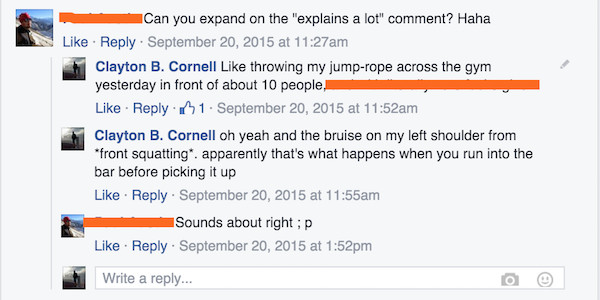
One Month Earlier – How this experiment got started.
“Hmmm, well looking at these numbers one thing jumps out at me. I wouldn’t say your testosterone is low necessarily, but it could be higher.”
I’m paraphrasing a discussion during an online consultation with Dr Alexis. A friend and digital-nomad, Alexis also happens to be a naturopathic Doctor and CrossFitter. She was reading over my most recent bloodwork, and we’d been incrementally dialing things in over the course of the year. We started with the basics, e.g. Vitamin D, B Vitamins, basic cholesterol ratios etc, but with an overall eye of filling in the blanks and getting things to ‘optimal’ wherever possible.
Lesson #1 – The most important piece here is access to cheap lab work. I spent most of 2015 in Budapest, where $1500 worth of bloodwork can be had for $120. If you don’t have access to the information in your blood, you’re flying blind when it comes to your overall health.
Some people are turned off by the word ‘naturopath’ which makes sense only if you don’t understand the difference between a naturopath (non-medical school training, maybe online certificate) and a naturopathic Doctor (requiring 4 years of medical school and a board examination). I didn’t get this at first and it’s clear that most people I’ve talked to don’t either.
“Naturopathic doctors are functional medicine practitioners who specialize in a drug-free, natural approach to healing the body through diet and lifestyle modifications and the use of natural medicines.” – dralexisshields.com
Either way, it’s hard to argue with the idea that one should start with diet and lifestyle before using refined or synthetic substances. If you can eat the plant, eat the damn plant, don’t take the pill.
Bottom line: science is observable, measurable, repeatable. Doesn’t matter what you call it if it follows the criteria and it works.
“So, how do I get my testosterone up then?”
The obvious question for someone who wants to be kicking as much ass as possible.
Lesson #2 – Big surprise, but you can make large, measurable changes to your blood chemistry, energy levels, and performance with simple dietary changes and no supplements. Food is the #1 drug.
Alexis came up with the following dietary recommendations which I expanded on with a little research (and re-reading the chapter on tripling testosterone in the 4-Hour Body). I want to emphasize here that most of the changes are related to changes in diet–I was already doing most of the activity-related pieces.
Also important: my general eating plan already tends to be somewhere on the lower carb, higher fat, higher protein end of the spectrum.
Here’s the initial advice Alexis gave me on eating, which formed the backbone of my experiment:
Eating more zinc and IF both help with boosting testosterone- yes!
Eat 1-3 servings of a high zinc food daily- beef, lamb, sesame seeds, pumpkin seeds, lentils, garbanzo beans, cashews, quinoa, turkey, shrimpOther dietary tips:
1. Add an additional serving of animal protein daily
2. Eat 1/4 cup of a fermented food daily- to help with proper gut flora effecting hormones and the immune system (sauerkraut, kimchi, kombucha, miso, tempeh, keifer (if well tolerated), any other fermented vegetable)
3. Eat full fat as much as possible (dairy if you tolerate it, and coconut milk, etc). The higher fat the better at this point to keep hormones improving.
Here is the Testosterone-Boosting Action Plan
I took the advice above and ran with it. Here is my full list:
- Eat *a lot* more fat & cholesterol.
- Eat foods high in Zinc.
- Eat fermented foods.
- Keep the carbs relatively low and avoid white death, I mean sugar, completely (as always).
- Avoid alcohol as much as possible. (a drink or two a week is probably OK).
- Lift heavy weights.
- Experiment with ice baths if you can take them.
- Sleep as much as possible.
- Play around with a few wildcards (e.g. posture, cinnamon in coffee, nettle root, etc).
The Dietary Component – Eat more fat and zinc-rich foods + fermented foods
Here are the specific fats and zinc-rich foods I ate:
Fats
- Grass-fed cow butter (Kerry Gold)
- Keifir
- Avocados
- Coconut oil
- Eggs
- Full fat Greek yogurt
High-Zinc Foods
- Brazil nuts
- Turkey
- Quinoa
- Pumpkin seeds
Fermented Foods
- Keifir
- Miso Soup
Basic Supplements (I was already taking these with one exception):
- Magnesium + Zinc – 3 tabs per day
- Fish Oil – 3 tabs per day
- Vitamin D – 2-5000 IU/day depending on whether I’m in the sun or not
- B-Vitamin complex
- Creatine (5g/day)
- Whey protein (ON)
- Saw Palmetto/Nettle Root – The only new addition for this test. Some background on this.
What these additions look like day-to-day:
A couple weeks into this upgraded eating plan and I was throwing barbells around like they were toys.
Breakfast
- Added a sprinkle of Cinnamon to ground coffee (Info on cinnamon and testosterone).
- Bulked up the bulletproof coffee: I may have gotten up to 2 TBs butter + 2 Tbs of coconut oil per cup (1 cup total). More like a milkshake than coffee, but damn good if you mix it properly (I use a battery powered latte whisk).
- Added another scoop of coconut oil and a half cup of pumpkin seeds to my morning smoothie.
Snacks
- Full-Fat Greek Yogurt – Ate one of these as a snack each day, 400g per serving.
- Brazil Nuts (2 nuts per day. Do NOT exceed this).
- Keifir – Found a local dairy with amazing Kefir and drank nearly one of these per day, about 0.5 L.
- Turkey Breast
Lunch/Dinner
- Miso Soup
- Eggs – Would eat about 4 per day.
- Added an extra Tbs of butter and or Olive oil to each meal.
- Avocado – I threw an extra avo onto almost everything.
- Quinoa – The occasional carb-load post workout.
Here’s a snapshot from MyFitnessPal:
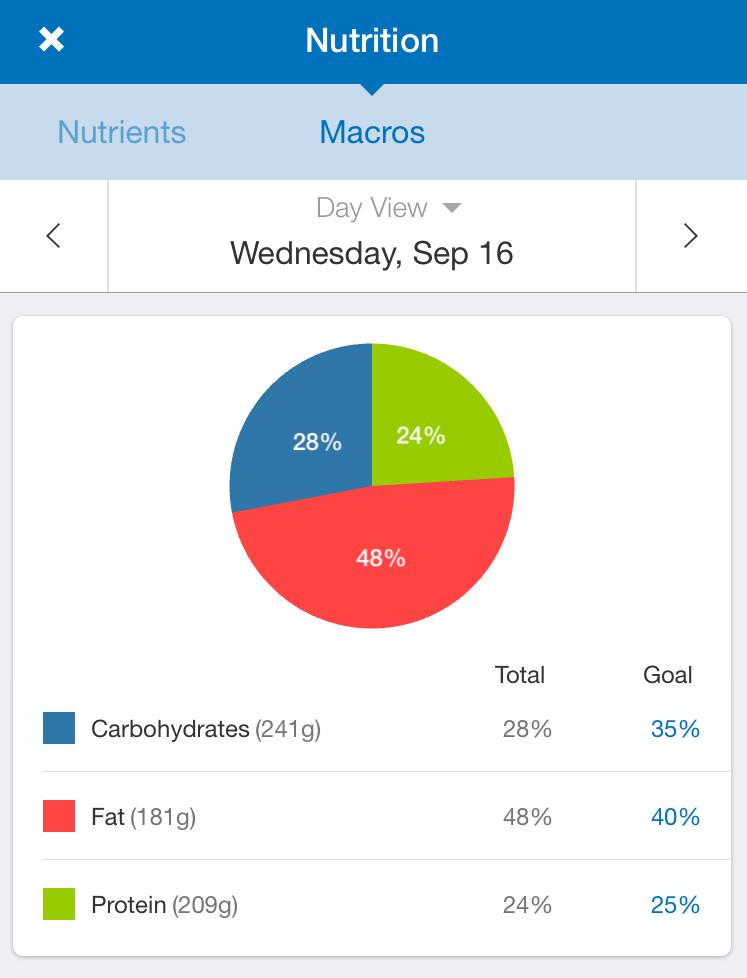
Activity Pieces for Boosting Testosterone
#1 – Lift Heavy weights
It is known that activating deep skeletal muscles, e.g. heavy squats will do all kinds of wonderful things to your body’s hormones. Plenty of literature out there, nothing new.
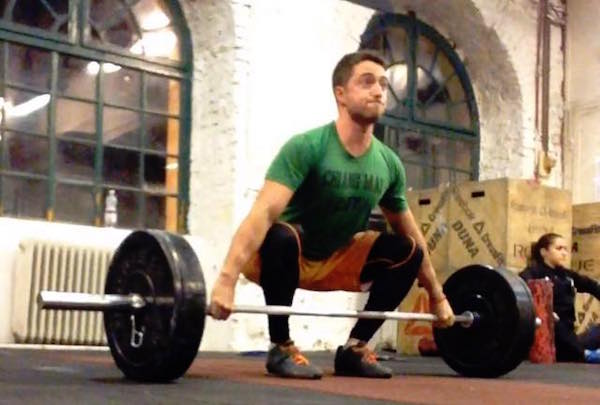
#2 – Sleep as much as you possibly can
After I heard Kelly Starrett mention he gained a bunch of lean muscle mass in a month simply from adding an hour of sleep each night (from 8 to 9 hours) I gave it a shot. That was around the beginning of 2015, and this was one of the best moves I’ve made in a long time.
I’ve needed a lot of sleep at every age (even between the ages of 17-21 when I was playing soccer), but these days I have zero guilt about sleeping for 9 hours. Part of this comes from starting to understand the full importance of working with individual variability. The genetic piece is also getting more accessible: how genetics influences performance (sorry that’s behind a paywall but worth the $).
Side note: I plan to do some genetic testing this year and I’m nearly certain it’s going to show ‘you need significant downtime to recover’. Stay tuned.
#3 – Experiment with ice baths
Another one from the 4-hour body / Podcast. Cold water has some awesome effects, and it will do some amazing things for recovery and energy levels. Still playing around with this one.
#4 – ‘Power pose’ Added to Morning routine
This was a sort of hilarious ‘why the hell not’ addition which I threw into my morning routine. We know that action creates emotion (see Thinking, Fast and Slow), e.g. force yourself to smile for a few minutes by putting a pen in your mouth and you will have a positive mood boost. So why not spend the first 2 minutes of each day emulating the posture of a champion. Here’s the science (Ted Talk): How your Body Language Shapes who you are.
Here are the actual lab measurements-
*Technical note – Hardest part about getting measurements done in another country is converting units and ranges. I had professional help to do this (Dr. Alexis) but we’re not ready for peer-reviewed journal submission here.
June 2, 2015
- Total Testosterone – 544.67 ng/dl (Low end of Normal)
- Free Testosterone – 1.74 nmol/l (Normal)
- SHBG – 59 nmol/L (HIGH)
- DHEA-S 3.98 umol/K
Sept 3, 2015
- Total Testosterone – 1148.4 lab ng/dl (HIGH)
- Free Testosterone – 1.72 nmol/l (Normal)
- SHBG – 74.71 nmol/l (HIGH)
- DHT – 344 nmol/l (Low)
- DHEA-S – 5.55 umol/l
Oct 6, 2015
- Total Testosterone – 697.41 ng/dl
- SHBG – 73 nmol/l (HIGH)
Important questions about this experiment-
Is this even remotely scientific?
Well, not really. As you can see we threw everything at the wall to see what sticks. It’s impossible for me to say what had the greatest affect on testosterone levels from the changes above. The only way to do that would be testing each change individually–something I don’t have the time or budget for.
What affect did this diet have on other biomarkers?
This is a great question, and here’s what happened between the tests on June 2 and Oct 6th:
- Triglycerides stayed the same, 67.26 mg/dL
- Total Cholesterol also stayed the same, at 208.49 mg/dL
- HDL increased, from 63.32 to 66.8 mg/dL
- LDL increased slightly from 139 to 145.17 mg/dL
- Lp(a) dropped (confusing units so not including)
I have a hunch that my high LDL is due to high dairy consumption, something I’m going to test next. More on this can be found in the interview with Dom D’Agostino on Ketosis.
How long can you sustain this diet?
Sustaining it is one thing. The question is will testosterone levels stay elevated and/or is it worth the affects on concentration. I ran with the diet for a few months with no problems. You can see that despite this my my testosterone peaked and then dropped off–enough to allow me to concentrate but not so much that I lost my strength gains. Lot’s more to explore there in terms of how to cycle this and if that’s worthwhile.
Is long-term elevated testosterone a bad thing?
Great question I don’t have an answer for. Our goal here was not extremely high levels but really trying to bring things up to ‘optimal’. More work is needed. Extremely elevated anything long-term is probably not good.
What about other things that affect testosterone availability?
This is key: you may have a lot of testosterone but it may be in an ‘unavailable’ form. When testing we looked at free testosterone vs total, as well as the wonderfully named SHBG (sex hormone binding globulin) which can take testosterone out of commission. My understanding of how to reduce SHBG and increase free testosterone is still pretty fuzzy.
Which tests do I get to repeat this experiment?
Make sure you test before you start as a baseline. These are the markers we used:
- Testosterone Free
- Testosterone Total
- SHBG (sex hormone binding globulin)
- DHT (dihydrotestosterone)
- DHEA-S
What programming/training plan did you use?
My buddy who is co-owner of the Reebok CrossFit Duna in Budapest wrote all my programming. He’s working on a publicly available version, so if you’re interested in the full Olympic lifting programming or basic beginner weightlifting progressions, click here and enter your email.
What other activity pieces have you not tested?
A few people recommended intermittent-fasting (IF), e.g. pack all eating into a fixed time window each day (like 8 hours). I did not have a chance to test this out but I think longer term it makes a lot of sense to work part of this in.
Were there any side effects?
One thing I noticed from this was the increasing tendency to get angry over trivial events. Since anger is self-perpetuating and habitual, I realized while writing this that I’ve been much more prone to irritation ever since. This is something I’ve combatted since adolescence, and as another habit can be broken. But something to pay attention to.
Do you own any other shirts besides that green Chiang Mai City shirt?
Yes I promise. But this one cost $2 and it’s pretty Spartan.
Some conclusions
This was a great experiment for me, not just for the results but also how quickly and dramatically it affected performance and overall energy levels.
I’m always looking for sustainable ways to boost energy levels and increase performance (this is about more than just fitness), and this is definitely going into the bag of tricks.
Would love to hear your comments if you’ve tried this or something similar. More on these topics to come, including experiments in ketosis, training, fitness for outdoor sports.
And remember kids, I’m not a doctor, so don’t take this as prescriptive in any way. It crucial to figure out how your own body responds to diet (especially macronutrient percentages) and activity.
Further Research
- Dietary Fats and Testosterone Production – AnabolicMen.com
- How to gain 20 lbs in 28 days (Tim Ferris)
- The 4-Hour Body (Tim Ferris), esp. chapter on Tripling Testosterone (see cliff notes here)
- The One thing that will make you better at everything – Barbell Shrugged podcast


